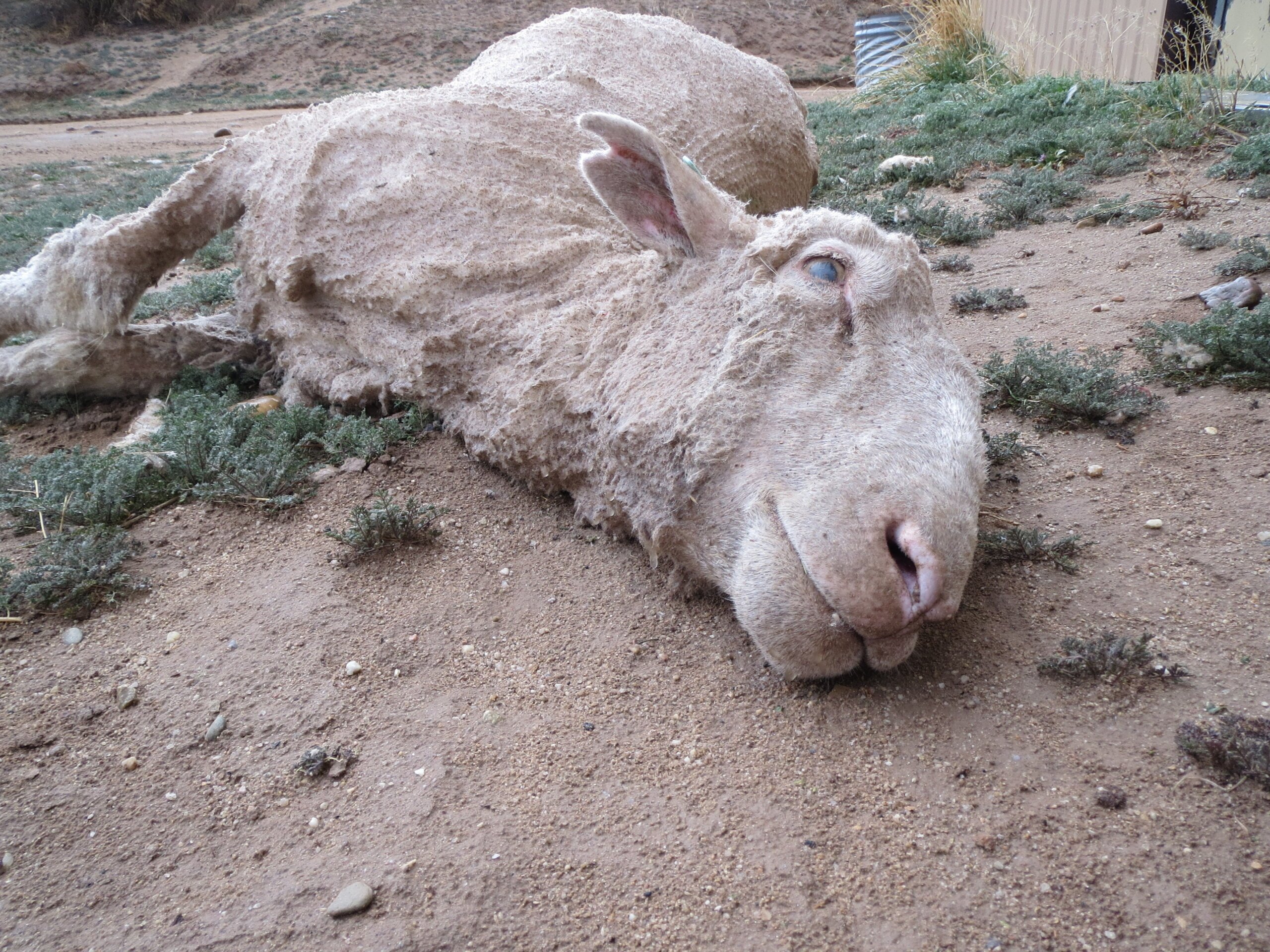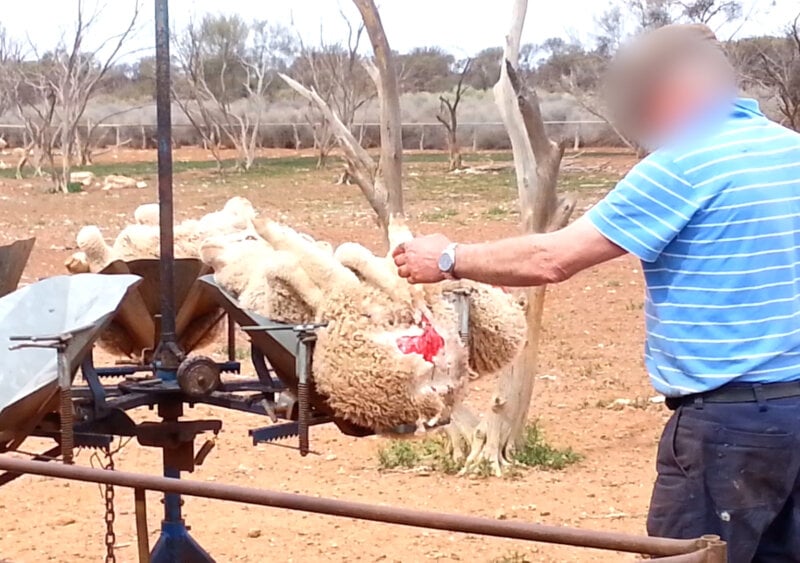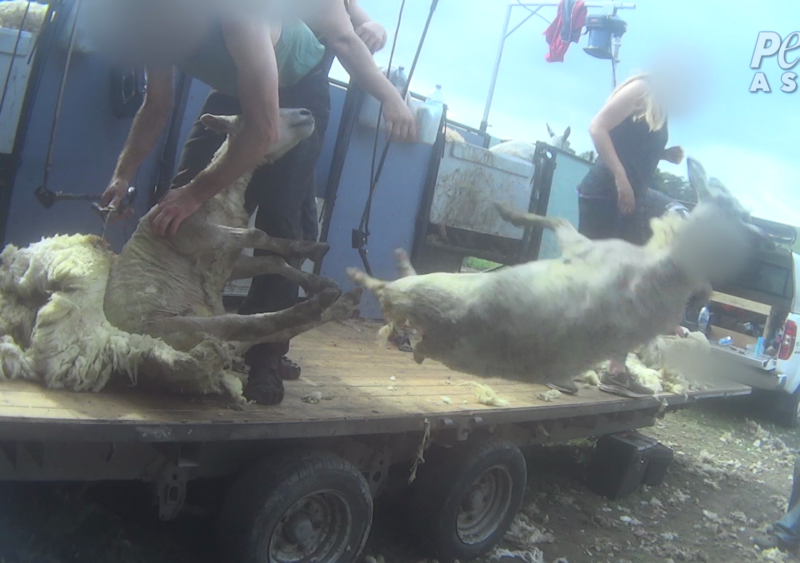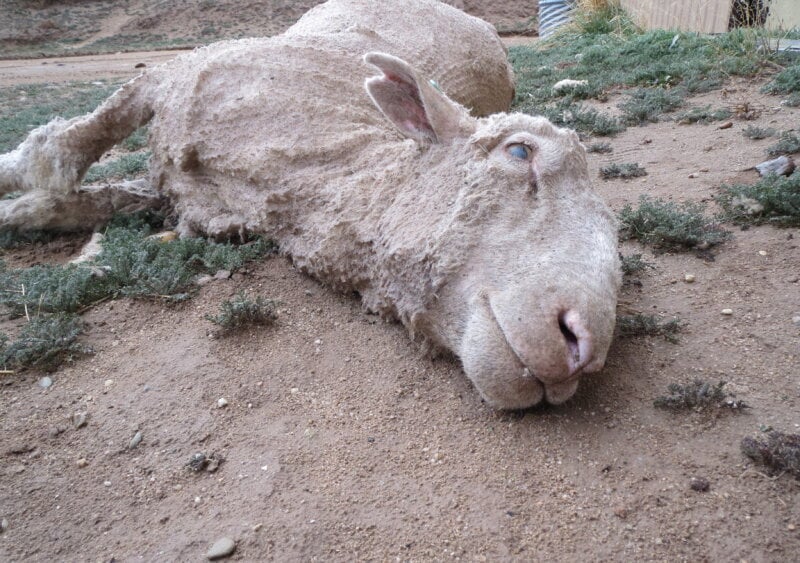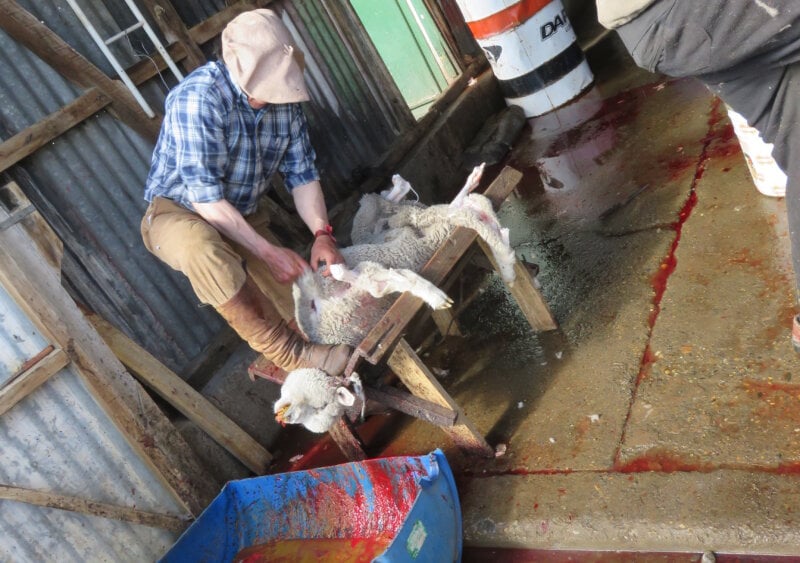The US
2014 – Colorado, Nebraska, and Wyoming
An investigator documented that workers abused and neglected sheep at 14 ranches across Wyoming – the second-leading wool producer in the US – as well as Colorado and Nebraska.
One shearer repeatedly twisted and bent a sheep’s neck, breaking it. After the shearer kicked the sheep headfirst down a chute, the investigator found her dead. The shearer bent, twisted, and bounced his bodyweight on dozens of sheep’s necks and forelegs and poked his fingers into their eyes.
Workers threw and kicked sheep around and cut them with shears. A shearer cut off part of one sheep’s ear with no pain relief whatsoever.
A rancher was recorded saying that he “got the ‘all permission’ to pound the fuck out of them”. Another said, “I want to choke that sheep. Cut her air supply off.”
“I want to choke that sheep. Cut her air supply off.”
The shearer bent, twisted, and bounced his bodyweight on dozens of sheep’s necks.
At one ranch, workers hauled a dying, lame ram gasping for breath into a trailer to be shorn. The animal was left overnight in the trailer, apparently without care, and found dead the next morning.
2017 – Utah
In April 2017, PETA US observers visited a massive sheep-shearing operation near Jericho, Utah, where thousands of sheep from Red Pine Land & Livestock, LLC, which was listed on Patagonia’s website as an approved supplier until the day it saw the video footage, are shorn each year. They found that Patagonia’s own standards were being violated.
Heavily pregnant sheep were handled roughly and callously: their necks were twisted, and they were pulled by their fleece, sent stumbling down steep ramps, and even whipped.
The seven-shearer crew could “pump out, like, a thousand [shorn sheep] a day”, according to one rancher. This would require each person to shear every sheep in an average of under three and a half minutes. Such speed inevitably leads to mistakes, and most of the shorn sheep had bloody wounds.
After PETA US’ video exposé showing workers at Patagonia’s previous “sustainable” wool supplier in Argentina hacking into fully conscious sheep and starting to skin some while they were alive and kicking, Patagonia severed ties with that operation and created a new “Patagonia Wool Standard” that was intended to be “the world’s most stringent criteria for animal welfare”. But no matter how “stringent” the standards, it’s impossible for suppliers to be humane when making money from animals.
PETA US’ observers witnessed numerous violations of Patagonia’s standards in Utah, including the following:
- Heavily pregnant sheep who were “ready to pop”, according to one rancher, were pulled by their wool into a trailer, quickly shorn, then sent stumbling down slippery ramps into a pen. Afterward, a worker whipped them to force them through a chute, all in violation of Patagonia’s wool standards, which state that “[h]eavily pregnant ewes should only be handled when absolutely necessary, and with care to avoid distress or injury”.
- Most of the sheep had bloody cuts – up to 5 inches long – near their tails and on their udders, ears, necks, and torsos. No one was seen treating any wounds, in violation of Patagonia’s wool standards, which state, “In the event of an injury, the shearer will cease shearing immediately to attend to the injury.”
- Pregnant sheep who had virtually no wool left to protect them from the elements were driven out into the desert, where temperatures dropped to as low as 32 degrees Fahrenheit (0 degrees Celsius), and left there to give birth. This violates Patagonia’s wool standards, which require that “[a]ll sheep have access to effective … shelter” and that “[t]he environment … not be … so cold as to cause distress”.
 © PETA
© PETAThe lambs born to Red Pine’s flock are considered the operation’s “main product” and are sold to California-based Superior Farms, the largest lamb slaughterer in the US and a supplier to Walmart and Kroger. In 2016, another animal rights group investigated a Superior Farms slaughterhouse in Dixon, California, documenting that workers jabbed sheep with electric prods and repeatedly slashed the neck of a struggling sheep and that sheep appeared to be breathing after their throats had been slit.
2019 – Nevada
In the Nevada desert, PETA US eyewitnesses documented that freshly shorn sheep were being loaded into trailers bound for a location hours away, in California. The sheep are used by Bare Ranch, which claims to produce “local” wool using “sustainable” methods with “respect” for animals.
But Bare Ranch workers shoved, hit, pulled, and pushed sheep while loading them into trailers. They struck the animals on the head and face, jabbed them with a paddle and a pole, kicked at them, and kicked the fencing next to them to frighten them into moving forward.
 © PETA
© PETASheep tried to jump or climb over each other in fear as they were herded towards the trailers. A few collapsed to their knees. And at least two had bloody wounds on their hindquarters, probably from fast and rough shearing.
Hitting, kicking, or otherwise abusing animals is never acceptable – especially when Bare Ranch claims to have “respect” for them – but during the eyewitnesses’ brief visit to this ranch’s operation, the animals were repeatedly subjected to such treatment.
Three sheep who had gotten loose were pursued by workers and dogs. Two of the exhausted, panting animals were chased, lassoed by the neck, and roughly yanked to the ground. Bare Ranch’s co-owner said that workers were “wasting time” trying to recover three sheep and that the animals should have just been left in the desert.
